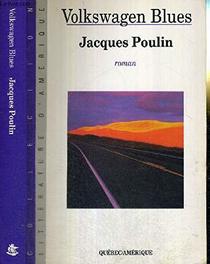I read the translated version of this book.
A 40-year-old French-Canadian writer from Montreal set out to find his long lost brother, whom he had not seen for 20 years. The only trace he had was a 15-year-old postcard from a small town in Quebec. At the beginning of his quest, he picked up a hitchhiker, a young Métis girl. Together, driving an old Volkswagen minivan, they traced the footsteps of the French explorers from the St. Lawrence to St. Louis, Missouri and then headed west along the Oregon Trail. This turned out to be a journey of self-discovery as well as a history lesson for the writer where he learned about the plight of the Native Americans through the eyes of a Métis.
With translated work, one has to wonder how much of the style of the writer actually came through in the translation. Regardless, this English version was a really nice, easy read where I was drawn into the narrator's quest very quickly: Where did the brother go? What happened to him and what became of him? However, it was very clear soon into the book that the process of how one reaches a goal is often as, of not more, rewarding as achieving the goal itself. This book was short-listed as one of five books in CBC's Canada Reads program in 2005. I would recommend this to anyone who is interested in exploring Canadian literature or who just wants a good read.
A 40-year-old French-Canadian writer from Montreal set out to find his long lost brother, whom he had not seen for 20 years. The only trace he had was a 15-year-old postcard from a small town in Quebec. At the beginning of his quest, he picked up a hitchhiker, a young Métis girl. Together, driving an old Volkswagen minivan, they traced the footsteps of the French explorers from the St. Lawrence to St. Louis, Missouri and then headed west along the Oregon Trail. This turned out to be a journey of self-discovery as well as a history lesson for the writer where he learned about the plight of the Native Americans through the eyes of a Métis.
With translated work, one has to wonder how much of the style of the writer actually came through in the translation. Regardless, this English version was a really nice, easy read where I was drawn into the narrator's quest very quickly: Where did the brother go? What happened to him and what became of him? However, it was very clear soon into the book that the process of how one reaches a goal is often as, of not more, rewarding as achieving the goal itself. This book was short-listed as one of five books in CBC's Canada Reads program in 2005. I would recommend this to anyone who is interested in exploring Canadian literature or who just wants a good read.




